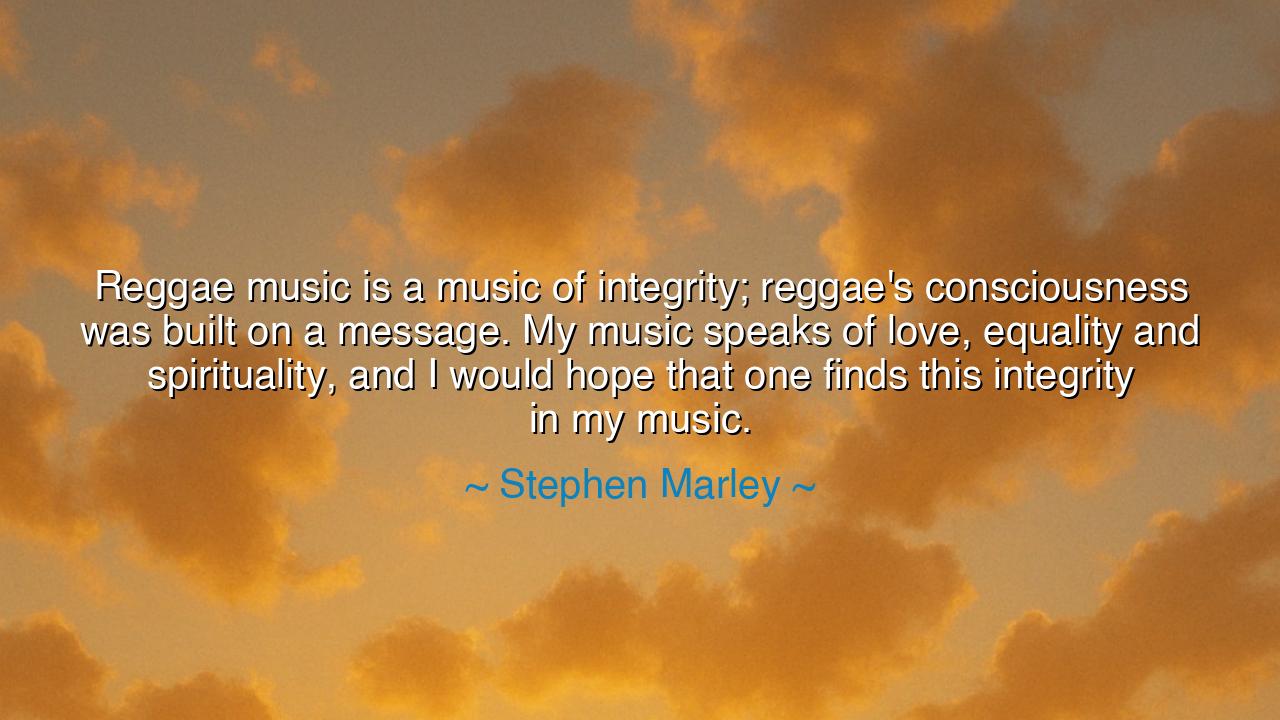
Reggae music is a music of integrity; reggae's consciousness was
Reggae music is a music of integrity; reggae's consciousness was built on a message. My music speaks of love, equality and spirituality, and I would hope that one finds this integrity in my music.






Stephen Marley once said: “Reggae music is a music of integrity; reggae’s consciousness was built on a message. My music speaks of love, equality and spirituality, and I would hope that one finds this integrity in my music.” These words, spoken by a son of the great Bob Marley and heir to a sacred musical tradition, are more than a reflection on art — they are a testament to the moral and spiritual foundation of an entire culture. In this saying, Stephen reminds us that reggae is not mere entertainment, not sound for the sake of sound, but a living vessel for truth, love, and justice. It was born from struggle, from prayer, from the yearning of a people to be seen, heard, and free. Integrity, in his words, means alignment — the harmony between message and melody, between rhythm and righteousness.
To understand the origin of this belief, one must look to the birth of reggae itself — in the heat of Jamaica, in the voices of the oppressed, and in the hearts of those who refused to let their spirits be broken. Out of the pain of slavery and the poverty of the ghettos came a rhythm that carried both lament and hope. It was not a song of defeat, but of defiance; not a dirge, but a declaration. The music was slow and deep, like the heartbeat of the earth, and within it were woven the threads of faith, resistance, and unity. When Stephen speaks of reggae’s “consciousness,” he speaks of this awakening — the realization that music can be both weapon and medicine, both protest and prayer.
His father, Bob Marley, became the world’s messenger of this truth. In a time when violence and division raged, Bob sang not for fame but for freedom. His songs — “Redemption Song,” “One Love,” “Get Up, Stand Up” — were hymns of humanity. They called people to look beyond skin and nation, to see the divine spark in one another. That is the integrity Stephen speaks of: the power of art that serves something greater than the artist. It is the refusal to corrupt beauty for profit or power. It is the courage to create not what pleases the world, but what heals it. In that way, reggae became not just music, but a moral force — a rhythm that lifts the weary and reminds the world of its soul.
In Stephen Marley’s own life, this legacy continues. He has carried the torch with humility, blending the ancient consciousness of reggae with new sound, while never betraying its message. Like his father, he speaks of love, not as a mere feeling, but as a way of life — the active will to do good, to forgive, to unite. He sings of equality, not as an abstract dream, but as a divine law: that all human beings share one destiny under one Creator. And he sings of spirituality, not bound by religion, but flowing like a river through all hearts that seek peace. Through his words and his music, Stephen reminds us that the integrity of reggae — and indeed, of all creation — lies in truth, not imitation; in purpose, not pretense.
To see this truth more clearly, look to the example of another artist who carried a message with courage: Nina Simone. Like Marley, she refused to separate her art from her conscience. In the midst of racial injustice, she sang “Mississippi Goddam,” a cry against oppression that cost her comfort but secured her immortality. Simone, like the Marleys, understood that music with integrity must speak to the soul of humanity. It must awaken, not numb; unite, not divide. Such integrity demands sacrifice — the willingness to stand for truth even when silence would be safer. But those who choose that path leave behind not just songs, but legacies that live forever.
And so, when Stephen Marley says he hopes people find integrity in his music, he is offering more than sound — he is offering a mirror to our own spirits. For integrity in art is the reflection of integrity in life. To create, to speak, to act from a place of truth is the highest calling of the human heart. Every word, every choice, every rhythm that springs from sincerity becomes a seed of peace in a world too often ruled by falsehood. The message of reggae — and of Stephen’s words — is that we must all become instruments of this same integrity, in whatever form our lives may take.
Let this then be your lesson: live and speak with integrity. Let your words carry the weight of truth, your actions the rhythm of compassion, your life the melody of purpose. When you create — whether it is art, friendship, or change — let it be real, born of love and guided by conscience. Do not chase noise; create harmony. Do not seek approval; seek meaning. The world does not need more sound — it needs more soul.
For in the end, as Stephen Marley teaches, integrity is the heartbeat of life itself. It is the rhythm that keeps us human, the song that never dies. And when your life is lived with that integrity — when your message, like reggae’s, is love, equality, and spirituality — you, too, will leave behind music that echoes beyond time: the eternal music of a soul in tune with truth.






AAdministratorAdministrator
Welcome, honored guests. Please leave a comment, we will respond soon